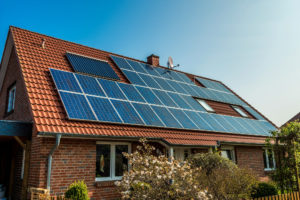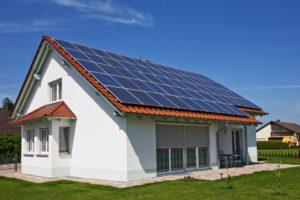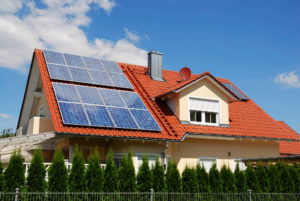With the increasing popularity of solar energy, many homeowners are considering whether to switch to solar panels. This article will help you make an informed decision by assessing the benefits, costs, technology advancements, and various factors to consider.
Contents
- 1 Key Takeaways
- 2 Assessing the Benefits of Going Solar
- 3 Understanding the Costs and Financial Considerations
- 4 Assessing the Current State of Solar Panel Technology
- 5 Factors to Consider Before Making a Decision
- 6 Case Study: Residential Solar Installation
- 7 Expert Insights From Our Solar Panel Installers About the Decision to Get Solar Now or Wait
- 8 Experience Solar Excellence with Us!
- 9 Conclusion
Key Takeaways
- Going solar offers numerous benefits, including reduced environmental impact, potential savings on energy costs, and increased home value.
- When considering solar panels, it’s important to assess the costs and financial considerations, such as upfront costs, return on investment, and available incentives.
- Stay informed about the current state of solar technology, including advancements in efficiency and price trends, while considering factors such as energy consumption patterns and future outlook to make an informed decision.
Assessing the Benefits of Going Solar
Understanding the Environmental Impact of Solar Energy
Solar energy is a clean and renewable source of power that plays a crucial role in reducing greenhouse gas emissions and combating climate change. Homeowners can significantly reduce their carbon footprint by harnessing the sun’s energy through solar panels. Solar power systems generate electricity without emitting harmful gases or pollutants into the atmosphere, making them an environmentally friendly choice for powering homes.
Potential Savings on Energy Costs
One of the primary motivations for homeowners to go solar is the potential savings on energy costs. By installing solar panels, you can generate electricity and reduce reliance on the traditional power grid. This means you’ll draw less electricity from the utility company, lowering monthly energy bills. Over time, the savings can add up significantly, offering financial relief and stability.
To further maximize your energy savings, consider the following:
- Net Metering: Many utility companies offer net metering programs, allowing you to sell excess electricity generated by your solar panels back to the grid. This further offsets your energy costs and may even result in credits on your electricity bill.
- Time-of-Use (TOU) Rates: Some regions have TOU rate structures that offer different pricing for electricity usage based on the time of day. By installing solar panels, you can strategically use electricity during off-peak hours when rates are lower, increasing your overall savings.
- Energy Efficiency: Pairing your solar panels with energy-efficient practices, such as using energy-saving appliances and LED lighting, can enhance your energy savings. By reducing overall energy consumption, you can optimize the benefits of your solar panel system.
Increased Home Value
Investing in a solar panel system can enhance the value of your home. Homebuyers increasingly seek energy-efficient properties with reduced utility costs and a smaller environmental impact. Studies have shown that homes with solar panels sell at a premium compared to non-solar homes. The additional value can vary based on location, system size, and local real estate market conditions. However, it’s important to note that the specific impact on home value may vary depending on individual market dynamics.
When considering the potential increase in home value, keep in mind the following factors:
- Regional Demand: The demand for solar-equipped homes may vary across different regions. Research the real estate market in your area to gauge the level of buyer interest and the premiums typically associated with solar installations.
- Energy Efficiency Certifications: Solar panels can contribute to obtaining energy efficiency certifications, such as LEED (Leadership in Energy and Environmental Design) or ENERGY STAR® ratings. These certifications can further enhance the marketability and value of your home.
- Transferability of Agreements: If you have entered into a solar lease or power purchase agreement (PPA), consider how the transferability of the contract may affect the home sale. Ensure that potential buyers are comfortable assuming the agreement’s terms or explore options to buy out the agreement if necessary.

Understanding the Costs and Financial Considerations
Evaluating Upfront Costs
When considering solar panels, it’s essential to understand the upfront costs involved in the installation process. The cost can vary based on factors such as the size and capacity of the system, the quality of the panels, and the complexity of the installation. While the initial investment may seem substantial, viewing it as a long-term financial decision is important.
To assess the costs effectively, consider the following:
- Obtain Multiple Quotes: Contact reputable solar companies and obtain multiple quotes for the installation. This allows you to compare prices, evaluate the quality of equipment offered, and make an informed decision based on your budget and requirements.
- Financing Options: Explore financing options available to make solar more affordable. Options such as solar loans, leases, power purchase agreements, and property-assessed clean energy (PACE) programs can help spread out the cost over time or eliminate the need for an upfront payment. Research the terms, interest rates, and eligibility criteria associated with each financing option to determine the most suitable choice.
- Government Incentives and Tax Credits: Take advantage of available government incentives and tax credits that can significantly offset the cost of installing solar panels. Research federal, state, and local programs that offer financial incentives for adopting renewable energy. The Federal Investment Tax Credit (ITC) is a notable incentive that can substantially reduce your total tax liability when you install a solar energy system.
Long-Term Financial Benefits
While the upfront costs may seem substantial, it’s essential to consider solar panels’ long-term financial benefits. You can assess the financial viability of going solar by evaluating the return on investment (ROI) and payback period.
Consider the following factors to understand the long-term financial benefits:
- Energy Savings: Solar panels generate electricity from the sun, reducing your reliance on the traditional power grid. Over time, this can lead to significant savings on your energy bills. Calculate the estimated energy savings based on your current electricity rates and usage to understand the potential financial gains.
- Return on Investment (ROI): The ROI of a solar panel system depends on various factors, such as installation costs, energy savings, and the duration of ownership. By analyzing the payback period and comparing it to the system’s expected lifespan, you can determine the financial viability of the investment. Remember that ROI calculations should account for inflation, utility rate increases, and system maintenance costs.
- Increase in Home Value: As mentioned earlier, solar panels can enhance the value of your home. The potential increase in home value should be factored into the overall financial assessment, as it contributes to the return on your initial investment.

Assessing the Current State of Solar Panel Technology
Advancements in Solar Panel Efficiency and Performance
Solar panel technology has undergone significant advancements in recent years, improving its efficiency and overall performance. Modern solar panels can convert a higher percentage of sunlight into usable electricity, maximizing the energy production potential. When assessing the current state of solar technology, consider the following factors:
- Efficiency Ratings: Solar panels are rated for efficiency, indicating how effectively they convert sunlight into electricity. Higher-efficiency panels can generate more electricity for the same amount of sunlight, increasing the overall energy output of your system. When evaluating solar panels, compare their efficiency ratings to make an informed decision.
- Monocrystalline vs. Polycrystalline Panels: Monocrystalline panels are made from single-crystal silicon, while polycrystalline panels are made from multiple silicon fragments. Monocrystalline panels tend to have higher efficiency ratings but can be more expensive. Polycrystalline panels offer a more cost-effective solution while still providing significant energy production.
- Thin-Film Technology: Thin-film solar panels are an alternative to traditional crystalline panels. These panels use a different manufacturing process, resulting in a sleeker, more flexible design. While thin-film panels typically have lower efficiency ratings, they can be advantageous in certain situations where space is limited or aesthetic considerations are important.
Solar Panel Prices and Market Trends
Solar panels have become increasingly affordable, thanks to advancements in manufacturing processes and economies of scale. However, it’s essential to stay informed about current market trends and pricing dynamics when deciding.
Consider the following aspects related to solar panel prices and market trends:
- Cost Reductions: Over the years, solar panel prices have experienced a steady decline, making them more accessible to homeowners. Various factors, including increased competition among solar panel manufacturers, improvements in production efficiency, and economies of scale, drive this cost reduction. It’s important to research current market prices and compare quotes from different suppliers to ensure you’re getting the best value for your investment.
- Government Incentives and Rebates: Besides the declining prices of solar panels, government incentives, and rebates can further reduce the overall cost. Many governments, both at the federal and local levels, offer financial incentives to encourage the adoption of renewable energy. These incentives can include tax credits, grants, or cash rebates. Stay updated on the available incentives in your area and take advantage of them to make your solar panel system more affordable.
- Future Price Trends: While current prices may be favorable, it’s worth considering potential future price trends. As technology continues to evolve, further price reductions or advancements in solar panel efficiency are possible. However, waiting for future price decreases might mean missing out on immediate savings and the environmental benefits of going solar now. It’s a balance between evaluating the current cost-effectiveness and considering any potential price changes in the future.

Factors to Consider Before Making a Decision
Energy Consumption and Usage Patterns
Before deciding to go solar, assessing your household’s energy consumption and usage patterns is important. Understanding how much electricity you use daily, monthly, and annually can help you determine the appropriate size and capacity of your solar panel system. Consider the following factors when evaluating your energy consumption:
- Historical Energy Bills: Review your past energy bills to understand your electricity usage accurately. Look for patterns in your energy consumption throughout different seasons and identify any areas where you can make energy-saving improvements.
- Energy Audit: Conducting an energy audit of your home can provide valuable insights into areas where you can reduce energy waste. Consider hiring a professional energy auditor or use online tools to identify potential energy-saving opportunities such as insulation upgrades, sealing air leaks, or replacing inefficient appliances.
- Future Energy Needs: Consider any anticipated changes in your energy consumption, such as adding new appliances, expanding your living space, or incorporating electric vehicles into your household. Accounting for future energy needs ensures that your solar panel system is appropriately sized to meet your requirements.
Available Resources and Financing Options
Researching available resources and financing options is crucial to making a well-informed decision about installing solar panels. Explore the following avenues to understand the available support and financial options:
- Local Solar Incentives: Research local incentives, grants, or rebates your city or state offers. Many regions have specific programs to promote solar energy adoption, which can significantly reduce upfront costs. Check with local government websites or contact relevant departments to understand the available incentives in your area.
- Federal Tax Credits: The federal government offers the Investment Tax Credit (ITC), which provides a percentage reduction in your total tax liability when you install a solar energy system. Currently, the ITC offers a 30% tax credit for systems installed between 2022 and 2032. This is an increase from the previously planned tax credit rates. Starting from 2033, the tax credit will decrease, decreasing to 26% in 2033 and further reducing to 22% in 2034. No maximum limit on the amount can be claimed under this credit. Familiarize yourself with the eligibility requirements and deadlines associated with the ITC to take full advantage of this financial incentive.
- Solar Financing Options: Explore different financing options available for solar panel installations. Common options include solar loans, solar leases, and power purchase agreements (PPAs). Solar loans allow you to finance the system’s upfront cost and pay it off over time, similar to a traditional loan. Solar leases and PPAs involve leasing the panels or purchasing the electricity generated by the system at a predetermined rate. These options can help reduce or eliminate the need for an upfront payment.
- Property-Assessed Clean Energy (PACE) Programs: Some areas offer PACE programs, which allow homeowners to finance energy efficiency and renewable energy improvements through an additional property tax assessment. These programs provide an alternative way to finance your solar panel installation and spread the cost over an extended period.
Future Outlook and Considerations
When considering whether to get solar panels now or wait, it’s important to consider potential developments in solar technology, government policies, and the energy landscape. While the current state of solar technology and incentives may be favorable, it’s worth considering the following factors:
- Technology Advancements: Solar panel technology continues to evolve, with ongoing research and development efforts aimed at improving efficiency and durability. Keep an eye on advancements in solar technology, such as the emergence of new panel materials or storage solutions, which may impact the cost and performance of solar systems.
- Policy Changes: Government policies and regulations related to solar energy can significantly impact the financial viability of installing solar panels. Stay informed about potential changes in incentives, tax credits, or net metering policies that may affect the long-term benefits of going solar. Consulting with local solar industry professionals or organizations can help you navigate any upcoming policy changes.
- Personal Circumstances: Your personal circumstances and priorities should also factor into your decision-making process. Consider your homeownership timeline, financial goals, and commitment to environmental sustainability. Waiting for further technological advancements or policy changes might be beneficial in some cases, while immediate energy cost savings and environmental benefits might outweigh the potential future gains for others.
Case Study: Residential Solar Installation
Background
In Columbus, Ohio, a growing number of homeowners are turning to solar energy to reduce their carbon footprint and save on energy costs. One such homeowner decided to explore the benefits of solar energy for their family home.
Project Overview
The homeowner contacted Solar Panels Network USA to assess the feasibility of installing a solar panel system. Our team conducted an energy audit to determine the household’s energy consumption and usage patterns. We considered the historical energy bills, conducted an on-site inspection, and evaluated the roof’s suitability for solar panel installation.
Implementation
We designed a customized solar panel system tailored to the homeowner’s energy needs. The system included high-efficiency monocrystalline panels known for their superior performance and longevity. The installation process involved mounting the panels on the roof, connecting them to the inverter, and integrating the system with the home’s electrical grid.
Results
The installed solar panel system generated enough electricity to cover a significant portion of the household’s energy needs. By utilizing net metering, the homeowner was able to sell excess electricity back to the grid, further reducing their energy bills. Additionally, the home’s value increased due to the energy-efficient upgrade, making it more attractive to potential buyers.
Summary
Our project in Columbus, Ohio, highlights the immediate and long-term benefits of investing in solar energy. By leveraging advancements in solar technology and taking advantage of available incentives, the homeowner not only achieved substantial energy cost savings but also contributed to environmental sustainability. The success of this project underscores the importance of considering solar energy now rather than waiting, as the benefits extend beyond financial gains to include significant environmental impacts.
Expert Insights From Our Solar Panel Installers About the Decision to Get Solar Now or Wait
The advancements in solar technology have significantly increased the efficiency and performance of solar panels. With higher efficiency ratings, homeowners can generate more electricity from the same amount of sunlight. This improvement, coupled with the decreasing costs of solar panels, makes it a great time to invest in solar energy now rather than waiting.
Senior Solar Engineer
One of the most compelling reasons to go solar now is the availability of government incentives and tax credits. The Federal Investment Tax Credit (ITC) can significantly offset the cost of installing solar panels. These incentives are subject to change, so taking advantage of them now can provide substantial financial benefits.
Lead Solar Technician
Considering the potential savings on energy costs and the increase in home value, going solar is a smart long-term investment. By reducing reliance on the traditional power grid and taking advantage of net metering programs, homeowners can lower their energy bills and see a notable return on their investment over time.
Solar Installation Specialist
Experience Solar Excellence with Us!
Trust in Solar Panels Network USA, where our seasoned experts deliver top-quality solar solutions for homes and businesses nationwide. With a legacy of countless successful installations and a commitment to sustainable energy, we’re your reliable partner in the solar journey. Ready for a brighter, eco-friendly future? Call us now at (855) 427-0058 and harness the power of the sun!
Conclusion
Switching to solar power offers numerous benefits, including clean energy, potential cost savings, increased home value, and reduced environmental impact. By assessing the benefits, costs, technology advancements, and various factors specific to your situation, you can decide to install a solar panel system. Take advantage of the current incentives and consult with reputable solar companies to determine the best path to affordable, renewable energy for your home.
Remember, the decision to go solar is personal, and it’s essential to consider your unique circumstances and preferences. By carefully evaluating the benefits and costs, you can choose to align with your financial goals, environmental values, and long-term energy needs.
About the Author
Solar Panels Network USA stands at the forefront of solar energy solutions, driven by a team of seasoned solar engineers and energy consultants. With over decades of experience in delivering high-quality solar installations and maintenance, we are committed to promoting sustainable energy through customer-centric, tailored solutions. Our articles reflect this commitment, crafted collaboratively by experts to provide accurate, up-to-date insights into solar technology, ensuring our readers are well-informed and empowered in their solar energy decisions.

